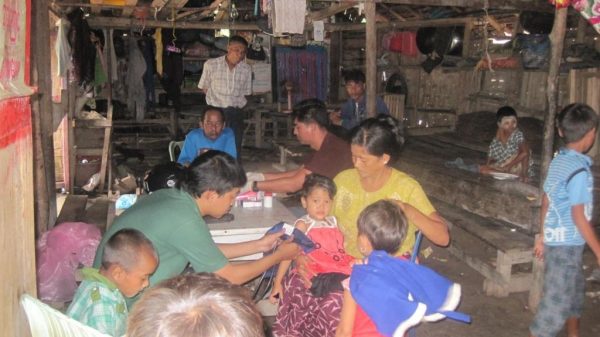Malaria often strikes hardest in the country’s remote areas which have little access to health services.

Staff from a mobile malaria team monitor a child’s health at a local school. Source: CAP-Malaria/URC
The Mekong Subregion has made considerable progress in reducing the burden of malaria. However, progress has been uneven and, in Burma, malaria remains one of the country’s major public health problems with around 37 million people at risk. Malaria often strikes hardest in the country’s remote areas which have little access to health services. The village of Pan Pone Chaung in Tanintharyi at the southern tip of Burma is one such area. Although the nearest health center is only 16 miles away in the town of Bokepyin, reaching it takes three hours by motorbike down a potholed road. When someone becomes sick, often the best their family can do is to wait and hope for the best.
Seven-year old Me Phyo and her family live in a hamlet of seven households just outside Pan Pone Chaung. Her family are farm workers, growing just enough to feed themselves and selling any surplus on the local market. When she developed a fever and stopped eating, her parents could not afford the transport costs to the health center. When they heard that a mobile malaria team from the PMI-supported Control and Prevention of Malaria (CAP-Malaria) project had come to Pan Pone Chaung, the family quickly carried their daughter to the local school, where the doctor, health assistant, and laboratory technician had set up their services. There, she was immediately tested for malaria and, after confirmation that she was infected with the parasite, she received the first dose of artemisinin-based combination therapy. The health worker also explained that malaria is caused by a parasite and can be prevented by using a mosquito net and wearing long sleeves during the evenings when mosquitoes are most active. He said it was important to finish the entire course of therapy to avoid relapses and the emergence of drug-resistant malaria. Three days later, Me Phyo was feeling much better, but continued taking her medicines with the support of her family. Her parents and neighbors are grateful that the mobile team stopped by at just the right time. Me Phyo’s aunt said, “the way to have happiness is just giving happiness to others and the one who gave great happiness to the villagers is USAID.”
During their visit to Pan Pone Chaung, the mobile team also met with the newly-recruited village health workers. These workers are trained by the CAP-Malaria project to reach out to community members with information about preventing malaria, provide testing using rapid diagnostic tests, and encourage patients who test positive for malaria to complete their treatment. The village health workers also work closely with the health center in Bokepyin to make sure severe malaria cases are promptly referred there for appropriate treatment and follow-up. Supporting mobile malaria teams and village health workers are just one of the ways in which PMI is working to reduce malaria and contain the spread of artemisinin-resistant malaria in the Mekong Subregion.
